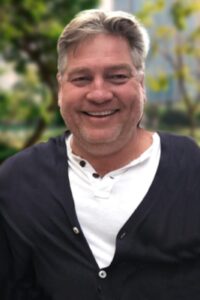
Martin Korver has always had the ability to identify and expound on why products are needed and when and where they are needed the most.
Born in The Netherlands, he joined the Dutch Special Forces after high school. Upon completing his service and returning home, he earned a Bachelor degree in Business Science and marketing. After working for a privately-owned company for a few years, Martin decided it was time to set out on his own. In the early 1990s, while he was living in Amsterdam, he started a company that created a network that processed credit card payments via cellular service. At the time, cell phones were still fairly new, so his company was considered to be extremely cutting-edge.
With a university friend, he then decided to take his business skills to South Africa. He sold his company and took the plunge. Over the next several years, Martin Korver started multiple businesses, many of which are still operational today. With Greenmouse Africa, his latest endeavor, he has created a business that sells cell phone accessories made of recycled plastic and sold with no individual packaging in the B2B environment This is in line with Martin’s firm belief in environmental sustainability.
In his free time, Martin Korver can be found with his family at the beach, sailing, or skiing. He also loves to travel. He has had a lifelong passion for classic cars and classic car racing, and you will always find him on the hunt for classic cars bargains!
What do you currently do at your company?
I am the founder and CEO of Greenmouse Africa. That means I have a hand in every part of the company. I like to be as involved as I can be, however not on a micro-management level. Of course, I’m surrounded by an excellent group of people that are all working hard toward achieving the same goals. We are in the process of rolling out our products in Southern Africa, as well as other parts of the continent. It’s very important to have the right people around you, especially at crucial startup times, like now.
What was the inspiration behind your business?
The inspiration for any business is seeing a need and finding a way to fill it. Sustainability has always been important to me. I want to provide a product that leaves the least environmental impact possible. The idea and business concept came from The Netherlands. Through a very dear friend of mine, I came in contact with Greenmouse and founded Greenmouse Africa. I had already been in the phone accessory business in the early 90’s, and I saw a need for more sustainable packaging for such items. There are more than 140 million active SIM cards in South Africa. We live in a world where for better or worse, we like and need to be connected. With traditional products, each item is individually packaged. You need scissors to open each part of it. Our concept is based on nothing being individually wrapped, and hence saving a lot of plastic packing material. Everything is just in a carton sleeve of its own. Because of my 30 years business experience in Africa, I am very familiar with the market in Southern Africa. There is a lot of trading to be done here, and I can see the potential for bringing our products to this area.
What defines your way of doing business?
I work on at least 80% intuition. Of course, I know and understand the business side of things, as well. I am financially very strong and reading a balance sheet and a profit-and-loss statement is daily practice for me. Sales is mostly a people-to people-business. You have to understand things like supply and demand, trading, and impulse purchases. All these elements go into a successful launch. For that reason, I am very focused on who I hire. My team members need to understand all of these things, too. Our business model itself is very simple. We produce sustainable phone accessories that have high margins for retailers. These are impulse buys, and people do buy them—it’s been proven in both South Africa and in Europe. The key is to put together a team that has the discipline to distribute our products quickly, as well as being an active part of development and innovation. A big help for us right now is that Apple has decided not to supply wall plugs anymore. Our company finds out things like that and knows how to use them to our advantage. Recognizing such abilities or potential in people is so important when you’re hiring. That’s where intuition comes in. The biggest part of any good business is finding and putting together the right team who is willing to go the extra mile.
What keys to being productive can you share?
I’m a firm believer that if you have to do your job for more than ten hours a day, you’re not fit for the job. You can’t run an entire business on your own, and putting in too much of yourself will only lead to exhaustion, possible burnout, and possibly mental issues, as well. It is important to know how to delegate responsibilities. For example, I don’t just tell people what to do, rather I’ll ask them if they can do things and then watch to see whether they surprise me—hopefully pleasantly. Productivity comes from within the people themselves, not from a hierarchy that I put in place or rules or regulations. When people enjoy what they do, they are productive. I also see and believe in the need for everyone to have a proper balance, both in their personal and professional life. At my company, we give our people all the tools they need to be successful. From various products to time off, it’s all there for our people to use. Showing that their happiness is important encourages them to work harder and to be more creative in their approaches. We see more productivity when we build up our team than when we demand things from them.
Tell us one long-term goal in your career.
I have a fairly simple long-term goal. I want to leave behind a fun legacy for my family and for the people who work for me.
How do you measure success?
For so many, the measure of success is how much money they make or how extravagant their lifestyle is. Life, to me, has little value if you totally burn out before you can enjoy it. Finding the balance between work life and personal life is how I measure success. For some, that may mean earning less money, but if you are doing something you love and are living a happy life, then what do you lose? I’m happy to work in a business that I enjoy. I’m happy that I am able to share that with a great group of people who also love what they do. I have yet to meet a CEO or top executive who works 80 hours a week that has found the same sort of balance.
What’s the most valuable lesson you’ve learned through the course of your career?
The most valuable lesson I’ve learned is to not try to solve everything for everyone. In business, you can guide others and give recommendations, but ultimately, other people have to achieve their own version of success. Besides, it can be exhausting trying to solve every problem that arises. It’s an impossible task to ask of anyone. Instead, give your team the tools and the empowerment to discover their own way of doing things. They will surprise you.
What advice would you give to others aspiring to succeed in your field?
Always be straightforward. Do not sugarcoat things. Be direct and don’t play political games. Be transparent about your expectations. Find a good coach or a mentor; someone who has been through what you are going through now. They have the experience and can provide you with excellent guidance and advice. Assemble your team with people who will cheerlead your successes and give you honest, straightforward feedback.
What are some of your favorite things to do outside of work?
My favorite things to do outside of work are sailing, skiing, and classic car racing. I also really enjoy hunting for classic cars, so whenever I can, I will visit classic car shows, or scan the market for new finds. Above all else, I am a family man. I really enjoy traveling and spending time with my wife and kids, especially at the beach.
How would your colleagues describe you?
I think my colleagues would describe me as fair, but sometimes hard, difficult, creative, and weird. I tend to be stubborn at times when I feel strongly about something. I’m extremely creative in the marketing and branding side of the business. I like to think outside the box.
How do you maintain a solid work-life balance?
I start early in the morning and work for several solid hours. When I work, I’m hyper-focused and my productivity is very high. What makes me different from other top executives is that I recognize that sometimes you do need a break in the middle of the day. I live very close to the beach, so I will sometimes pause to take my dogs for a walk. This gives me a chance to reset my mind and recharge for a productive afternoon. It’s the same as sailing. It gives you a chance to put your mind away for a while and just be at peace. It’s all part of the same balance I find so important. Eat healthy, exercise, have fun and take those moments when you can.
What is one piece of technology that helps you the most in your daily routine?
My iPhone is the single most important piece of technology that I use. My parents live in The Netherlands. I currently live in South Africa , but we are still able to connect instantly because of technology. Not only that, it has everything I need to keep my day organized—my calendar, my contacts, everything! It’s all right there in my hand.
What has been the hardest obstacle you’ve overcome?
Funding is probably the hardest element of a new business to find and lock down, especially when you’re just starting out. You may have a great idea, but if you can’t find the investors to get it off the ground, you’re done even before you can start. Banks are not interested in risk, which is a worldwide problem. A lot of would-be entrepreneurs are stuck in the preliminary stages of building a business because they don’t understand the intricacies of the financial world. They can’t properly express themselves to the people they need to get funding from. Now that I have been in business for years, I can use that experience to my advantage. In the beginning, though, I had to do a lot of learning.
Who has been a role model to you and why?
Both my mother and father have been excellent role models to me. They are both very balanced and very smart. As a consequence, I enjoyed quite a balanced upbringing in a relatively protected environment that they created in our home. I am blessed because they are both still alive and doing well. They travel often, and still inspire me to this day.
What is one piece of advice that you have never forgotten?
One of my first bosses, while I was still young and relatively eager, gave me an excellent piece of advice that I have carried with me ever since. He said: “If you bump your head on a stone wall three times, you might start thinking about going around it.” To me, that’s a great way of expressing that you should always look for different ways to achieve your goal. Don’t waste time trying something that has already not worked. Take a step back, reevaluate, and find another way.
Read more:
Getting to Know you: Martin Korver, Founder and CEO of Greenmouse Africa




